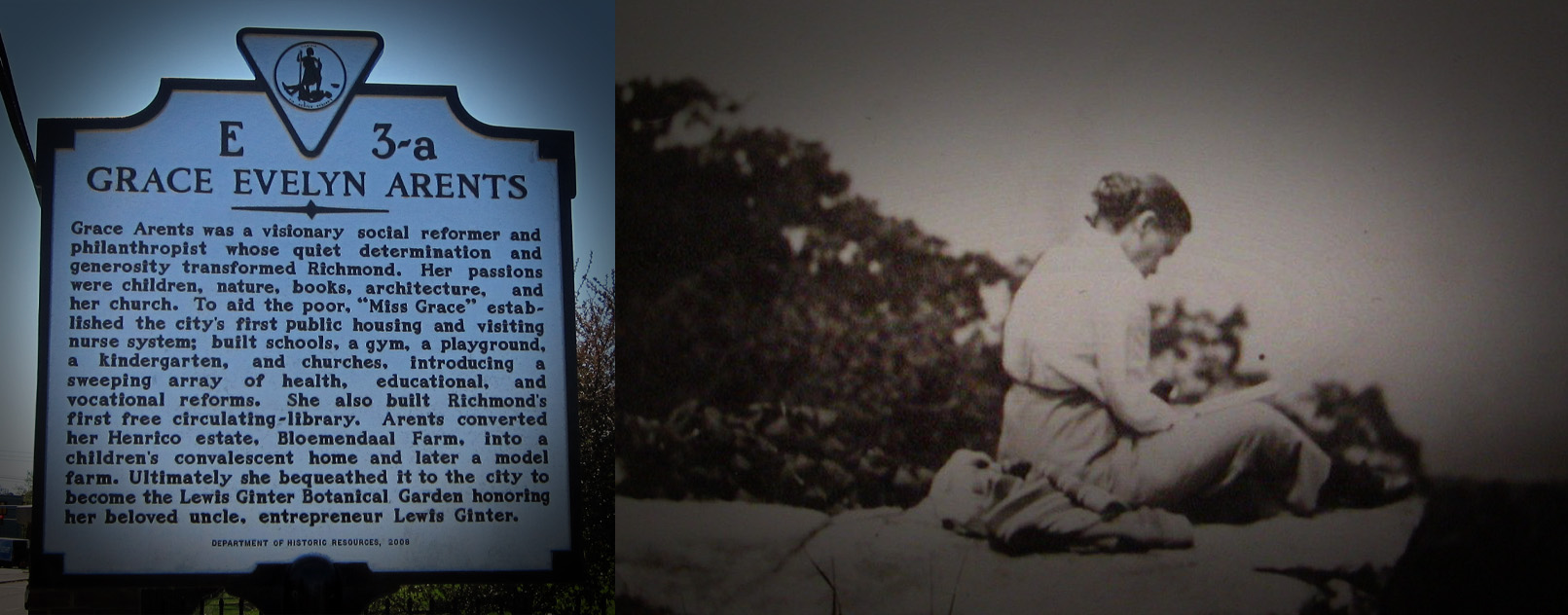Grace Arnets - The Angel of Oregon Hill
July 30th, 2024

Richmond has long been a hub of industry and politics, giving rise to many individuals whose names have been etched into history. Amongst the many individuals who have left a lasting impact is Lewis Ginter, the successful businessman and industrialist whose name is emblazoned on the city’s impressive botanical garden. He is also the man behind The Jefferson Hotel and the Ginter Park neighborhood, amongst his other ventures.
Despite the lasting impact that Ginter left, few are familiar with his personal and family life. Ginter would never marry, but he did develop many close relationships in his life and stayed well connected with his family, including his niece, Grace Arents. Grace would move to Richmond in 1876 to live with Lewis, along with her mother and two of her sisters.
Grace was shy by nature and guarded her privacy, but that did not curtail her involvement in the community. She had a particular concern for the city’s working-class and those enduring financial hardship, many of whom resided in the Oregon Hill neighborhood. Grace would spend a considerable amount of time and money to improve their situation, often unsolicited and anonymously. As a member of the Episcopal Church, one of Grace’s main beneficiaries was St. Andrew’s Church, whose financial needs were almost entirely fulfilled by Grace. With Grace’s support, St. Andrew’s would become not only a place of worship, but also a social center in the community.
Grace would live with her uncle through the rest of his life, and when Lewis passed away in 1897, Grace inherited approximately $1.2 million (about $46 million in 2024 dollars). Having already adopted a fairly modest lifestyle, at least in comparison to the wealth around her, Grace used her fortune to amplify her philanthropic efforts.
One of her biggest projects was to finance the construction of a new St. Andrew’s Church. The impressive Gothic Revival structure would be dedicated in 1903 and stands today as one of Richmond’s architectural gems and a historic landmark. She would also underwrite the construction of Saint Andrew’s School, a tuition-free institution in the community. Grace also built a series of comfortable homes nearby that would become the city’s first subsidized housing. The proceeds from the housing rents were used to establish an endowment for Saint Andrew’s School.
These were just a few of Grace’s philanthropic efforts in the Oregon Hill community. Her generosity did not go unnoticed, with many calling her the “Angel of Oregon Hill”. Grace’s philanthropy did not end at the borders of the Oregon Hill neighborhood. She sponsored similar projects in the city’s Ginter Park neighborhood; donated the home she had inherited from her uncle on Franklin Street for use as the city’s first public library; gave to many religious orders (regardless of faith or denomination) for the care of the sick and poor; and established a hospital for poor children at Bloemendaal in Henrico County’s Lakeside neighborhood.
The Bloemendaal site had originally been acquired by Lewis Ginter for use as the Lakeside Wheel Club. With Grace’s transformation of the property, she eventually moved there herself to live out the final years of her life quietly, and to continue her philanthropic efforts. While at Bloemendaal, Grace indulged her love of gardening, developing a small farm of about 72-acres.
In Grace’s will, she granted her partner Mary Garland Smith a life interest in Bloemendaal, after which it was to become the property of the City of Richmond. Grace would pass away in 1926 of a heart attack, and Smith continued to live at Bloemendaal until her death in 1968 at the age of 100. Plans would move forward over the subsequent years to fulfill Grace’s vision of the Bloemendaal property becoming a botanical garden to honor her uncle. Lewis Ginter Botanical Garden would open to the public in 1984.
Even with having donated her estate and having her vision fulfilled, it seems that Grace may not be entirely willing to let go of Bloemendaal. In the place that Grace called home, members of the garden staff have reported seeing her in the living room wearing a green dress. Her presence is benign, as her shy nature seems to shine through in the afterlife. She’s likely to leave you alone, that is unless you seem to enjoy cigarettes.
It seems that despite the source of much of her inherited fortune, Grace doesn’t care for smoking. Perhaps it was a personal preference, or perhaps as she lingered on in the afterlife, she started to see that smoking wasn’t nearly as harmless as originally thought. Given Grace’s concern for the safety and welfare of the community, it’s fairly easy to see where she might object to the vice. Workers at Bloemendaal with a fondness for tobacco have found that they should save their smoke breaks for someplace away from Grace’s house. A worker who was careless enough to leave their ashtray unattended found that it disappeared without a trace, never to be seen again. Likewise, a pack of cigarettes may go missing or have all of the cigarettes broken so that they could not be smoked.
Since those days, smoking at Lewis Ginter has been prohibited, a move that Grace would likely approve of wholeheartedly. It is admittedly hard to confirm much about Grace with absolute certainty considering her desire for privacy and anonymity. Most of Grace’s personal documents were destroyed at her request after her passing, leaving the community little to get to know her by. We certainly appreciate her desires, but we do encourage you to give Grace a quiet “thank you” the next time you’re visiting Oregon Hill, Lewis Ginter Botanical Garden, or one of Richmond’s Public Libraries.
Site contents copyright 2024 Haunts of Richmond unless noted otherwise. All rights reserved. Website by Richmond Historic Haunts, LLC.
